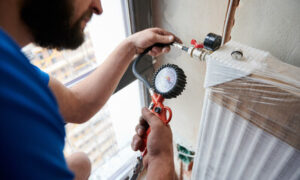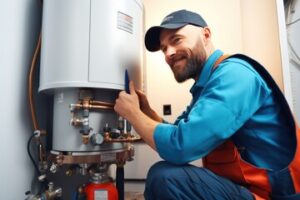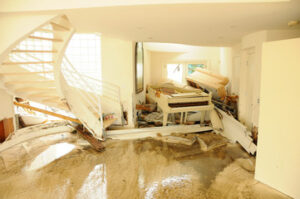Faucet repair can be simple if you know what to look for. Start by shutting off the water supply to your leaking faucet and plugging the drain. Next, remove the decorative cap on the handle and pry off the screw. Allen wrenches are usually used, but your repair kit may include a spanner tool.

A dripping faucet is more than an annoyance; it wastes water and money and may damage your home’s plumbing system. In addition, mold and mildew grow where water collects, which poses health and structural risks. While many homeowners can perform basic DIY faucet repair, knowing your limits and understanding when a task requires professional help is important. Contact Plumber Topeka for professional help.
The most common cause of a leaky faucet is a worn-out O-ring. While this part creates a water-tight seal, it is susceptible to degrading over time due to age, use, and exposure to harsh chemicals. Inspect the O-ring and replace it if necessary.
Another common problem is a loose packing nut. This nut is responsible for turning the sink handles when you turn on the water, and it can become loose over time. This is an easy fix, and can be accomplished by first removing the handle. Once the handle is removed, you can access the nut and tighten it to stop the leak.
Before beginning any repairs, shut off the water supply valve under your sink by turning it clockwise. Then, dry up any standing water in the sink area and cover the drain with a towel or old T-shirt to prevent small parts from falling down the sink drain.
Next, remove the handle by unscrewing the set screw with a wrench or screwdriver. Be careful not to damage the handle or spout. After removing the handle, you can access the adjusting ring and disk cylinder mounting screws. You can also remove the escutcheon cap with a screwdriver and use a blunt tool to lift out the neoprene washers in the cylinder. You should then clean these parts using distilled white vinegar and a soft-scouring pad. If the neoprene seals are damaged, you should replace them.
You can usually find replacement O-rings and washers at your local hardware store. Once you’ve replaced these components, you can reassemble the faucet and turn on the water to ensure a secure water-tight seal. When you’re finished, be sure to test the faucet for any leaks.
Leaks in the handle
The drip, drip, drip of faucet leaks in the handle is annoying enough, but it can also be expensive if it’s not repaired. These kinds of leaks are less common than other types, but they can still waste thousands of gallons of water per year. The first step in fixing them is to shut off the water supply, either at the fixture shutoff valves under the sink or by turning the main water off in your home.
Once the water is off, you’ll need to remove the handle and packing nut. Fit a wrench to the large six-sided packing nut beneath the handle and loosen it. It may unscrew in one direction or the other, so try the opposite if you’re having trouble. Once the nut is loose, you can pull off the handle and the stem.
Depending on your faucet, the stem may be removable by itself or with a small screw at the base. Once the stem is out, you can take off the decorative cap on top of the handle with a flathead screwdriver. Place the removed parts in order as you take them off, so they’re easy to reinstall once you start putting everything back together again.
While you’re removing the handle and packing nut, you can also inspect the other components in the handle for damage or mineral buildup. If you notice a lot of debris in the seat washer or valve seat, for example, pouring white vinegar over them can help break up and dissolve it.
If the valve seat or washers are corroded, replace them. A trip to your local hardware store should provide the necessary parts, or you can try a kit of replacements from a plumbing supply specialist.
Once you’ve replaced the damaged parts and reassembled the faucet, turn the water on again and check for leaks in the handles. If the leaks persist, you may need to tighten the packing nut again or replace it altogether. If you’re having trouble finding the right part, you can always call a plumber for assistance.
Leaks in the supply line
Sometimes, leaks originate in the supply line that connects to the faucet. This is often due to worn out or loose parts. If the supply line has a tight connection, it can prevent leaks. If the connection is loose, it can be easily tightened by using a basin wrench (available at home centers and hardware stores). Turn off the water valves under the sink before starting to avoid water waste. You can also remove the faucet and drain the lines to make sure there is no excess water in the lines. Before you begin the repair, loosen the mounting nuts and raise the faucet base about 1/2 inch above the sink. Scrape away any hardened putty and stuff plumber’s putty under the base plate evenly. If the leak is not resolved, you may need to replace the supply line.
Depending on the type of faucet, you may need to replace other parts. For example, a plastic disc or set screw may be located on the handle(s). This can be removed with a screwdriver or Allen wrench and can usually be replaced without much difficulty. You may also need to replace the inlet and outlet seals. These can be purchased separately or in a kit from most major hardware stores.
You may also need to replace the O-ring, which is a common cause of leaky handles. These can range in size from 3/8 to 5/8 of an inch, so you may want to take the old O-ring with you to the hardware store to ensure an exact fit. It is a good idea to coat the new O-ring with nontoxic, heat-proof plumber’s grease to help it stay in place.
Leaks from the handle can be caused by a worn-out or loose gasket. Replacing this is a relatively simple task and it’s usually inexpensive. The gasket is a small rubber ring that fits between the handle and the faucet base. It can become hard and brittle over time, which is when it starts to leak.
If the leaks continue, you may need to replace the washer or stem assembly. You can find these at most home improvement centers and some hardware stores. Alternatively, you can call a plumber to do the job. A professional plumber is able to see the loose parts that are farther down in the pipe and can tighten them. This eliminates drips and stops future problems.
Leaks in the spout
A leaking faucet from the spout can be more difficult to diagnose than leaks under the handles. This is because the spout is farther away from the valve seat and can be prone to corrosion. A professional plumber can replace the spout seals, which will stop the drips. In addition, a plumber can clean the spout and other parts of the faucet to remove sediment buildup.
The first step in repairing the spout is to turn off the water supply to the sink. The shutoff valves are usually underneath the sink in the basement or in the garage. They may be labeled hot and cold, or they may have a single handle that turns off both the water supply and the flow.
If the faucet is a cartridge or ball type, it must be removed to access the inside of the spout. First, remove the decorative cap from the handle with a pocketknife or screwdriver. This exposes the hex-head screw that holds the handle. If the screw is corroded, use penetrating oil to loosen it. Once the screw is removed, the handle will lift off.
To find the cause of the leak, remove the handle and unscrew the stem nut. This will expose the O-ring and valve seat washer, which can be corroded from sediment. Replace these parts with new ones and coat them with nontoxic plumber’s grease. If the spout still drips, it’s probably time to replace the ceramic disk in the spout cylinder.
Once you have replaced the spout components, put everything back together and turn on the water. If the spout continues to drip, it is likely due to the valve seat, which is pitted from years of sediment buildup. If you cannot fix it with emery cloth, grind it flush and replace it. A dripping faucet is annoying, but it’s also costly. One drip per minute wastes about 34 gallons a year. To save money and resources, repair the faucet as soon as you notice a leak. A trained plumber can make the job much easier and faster, and he or she understands codes, what materials work best with your pipes, and how to install them properly.









